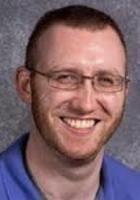Connect with hundreds of tutors like James
America's #1 Tutoring Platform
Who needs tutoring?
FEATURED BY
TUTORS FROM
- YaleUniversity
- PrincetonUniversity
- StanfordUniversity
- CornellUniversity

James
Bachelors, Management/History/Social Studies Education
Purdue University-Main Campus, Purdue University-Main Campus
About Me
Teaching is about more than the content. It is about building better people. I look forward to working with you and all that I ask is that you come in with an open mind to what we are going to discuss.
Education & Certifications
Purdue University-Main Campus
Bachelors, Management/History/Social Studies Education
Purdue University-Main Campus
Masters, Educational Leadership
Q&A with James
Everyone learns in a little bit different way, and we all learn at different speeds. As a teacher, my job is to help coach you to find those individual ways to succeed and learn from the mistakes that are made in that exploration process.
Connect with a tutor like James
Connect with a tutor like James
Tutors with Similar Experience


Maggie
10+ YearsNew York University
Bachelor of Science, Digital Communications and Multimedia
View Profile